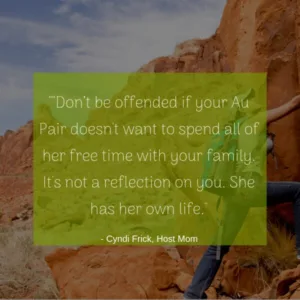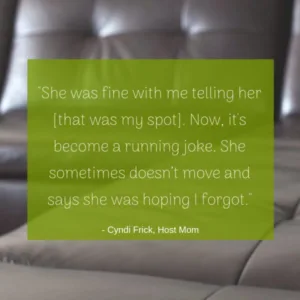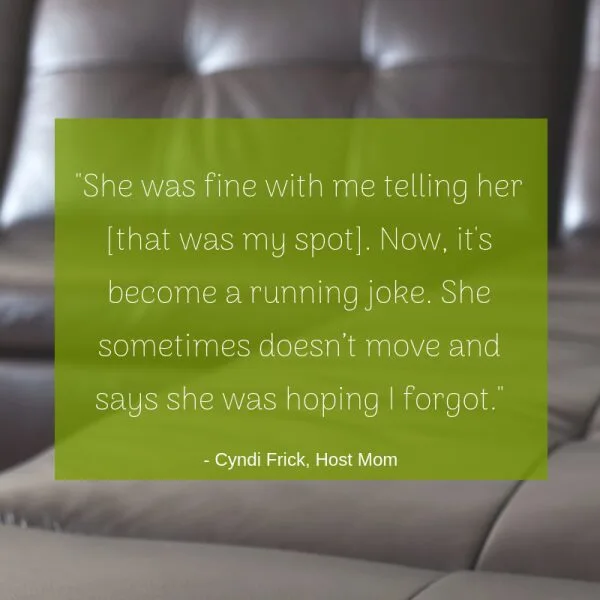Every placement has an adjustment period. All Host Families and Au Pairs are different (kind of like how everyone tells you that every child and every pregnancy is different). And when you take into consideration how much cultural variance we have, just within the United States, it’s impossible to predict the exact experience you will have.
Regardless, there will be across-the-board issues will need to be addressed during the first several weeks. This is what I called our “adjustment period,” when we were still adjusting to hosting our Au Pair. Likewise, she was adjusting to living with us.
Here are the issues we faced during our adjustment period. Hopefully, our insights will help yours go smoothly!
Issue #1: Co-habitation vs personal space
 Privacy is a huge concern when hosting an Au Pair. Every person is unique in his or her need for a different amount of alone time and personal space.
Privacy is a huge concern when hosting an Au Pair. Every person is unique in his or her need for a different amount of alone time and personal space.
Some people, such as myself and my husband, like to be in the company of others. We don’t require our Au Pair to retreat to her room after dinner so that we can be alone together or with the children. (However, we do tell her that if she needs some space away from us or the kids that she should feel free to go to her room, and we won’t question her reasoning).
Au Pairs need space and separation to absorb and digest new things in the first few weeks. So, don’t be offended if your Au Pair doesn’t want to spend all of her free time with your family. It’s not a reflection on you. She has her own life, her own friends and interests. In fact, spending time apart can be a good thing for both of you.
In some instances, an Au Pair may wish to spend time with your family, but she may feel like she’s in an awkward position. The children are too young to understand the difference between her “on duty” and “off duty” times.
When you notice this happening, as it did in our home, you should try to tell your children to “let her relax” or “leave her alone” so that she doesn’t feel like she can’t be around the family without having to help.
Our Families agree... Au Pair child care is the best!
Issue #2: Working through awkward moments
Obviously, when a stranger from another country comes to live in your home there will be awkward moments. Or, perhaps a slip of the tongue.
In our case… I may or may not have used the word “Nazi” as a joke, by accident. (Lucky for me, our German Au Pair is super cool and jokes about that topic herself. Phew!)
In her first week, our Au Pair accidentally broke the decanter for our coffee pot. This coffee pot that is only for guests because my husband and I aren’t coffee drinkers.
As much as I promote communication, I was still a little hesitant to bring up the matter of her paying for it since our relationship was still so new. And the coffee pot was only $10. So, I told her I’d placed an order for a replacement, and she asked how much it cost.
Being a responsible girl, she paid for the new decanter without being asked, and there were no hard feelings.
That being said, however, we learned from this small incident. From now on, I think a precedent should be set, in our family handbook or in a discussion, about how anything broken by the Au Pair should be handled. (Because chances are, in a year’s time, something will probably be broken again).
Some situations within the adjustment period will be majorly awkward, while some things will be minor. But minor issues, if left to fester, will eventually grow into large problems.
When you don’t want to say something, but you really should.
 Case in point, at our house, we have a sectional with a chaise lounge on one end. Of course, that is the most coveted, most comfortable spot on the whole couch, and it’s positioned directly in front of the television.
Case in point, at our house, we have a sectional with a chaise lounge on one end. Of course, that is the most coveted, most comfortable spot on the whole couch, and it’s positioned directly in front of the television.
Years ago, my mother-in-law claimed that spot as hers when she came to visit, and it used to annoy me… Until I said something. Ironically, she had done the very same thing to her own daughter on an extended visit to Arizona. In that case, however, she didn’t realize she had assumed her daughter’s “spot” until a month into the visit, leaving her to feel guilty and wondering why no one said anything earlier.
What do you think happened when my Au Pair came to live with us? She liked that spot on the chaise too (my spot).
Even though it has a permanent indentation of my rear in it.
I thought I’d just let her sit there… Until it started to slightly annoy me. At which point, I told her that she can sit there any time during the day, but after the kids go to bed, it’s my spot for two hours.
She was fine with me telling her. In fact, she was glad I did. Now, it’s become a running joke. She sometimes doesn’t move and says she was hoping I forgot.
In the grand scheme of things, it wasn’t a huge deal, but when you’re hosting someone for a year or more, you need to remember to keep things from getting out of hand.
Issue #3: Teaching and patience
Because Au Pairs come from a variety of backgrounds, you can’t just assume that they know what most things are… like how I assumed that my Au Pair would know what a grilled cheese sandwich was and how to make one for my son. She didn’t.
It turned into a teachable moment, one in which she learned that she likes grilled cheese sandwiches, a classic American staple. This was an adjustment period I hadn’t anticipated. I suspect all Host Families will find it’s the small things that creep up on us, like food or dish soap.
(Furthermore, on my topic of assumptions… You shouldn’t assume, just because she’s infant-certified or has experience with children, that she knows exactly how you like your baby to be diapered and bathed or how you like your toddler to get ready for his nap).
Let her know how you communicate.
 There’s so much to learn, absorb, and process in the first few weeks, and it will all take time. You or she may become frustrated and start to question the choice to host or to have become an Au Pair so you need to be patient.
There’s so much to learn, absorb, and process in the first few weeks, and it will all take time. You or she may become frustrated and start to question the choice to host or to have become an Au Pair so you need to be patient.
Let your Au Pair know that it is okay to ask questions, and don’t make her feel bad for doing so, even if her asking is a disruption to what you’re doing at the time.
In the case of hosting an Au Pair, there really are no “stupid questions” (even though I do think that there are certain circumstances in life where there are stupid questions).
When you are teaching your Au Pair, remember that it is often a trial-by-fire process. They get tossed into that fire almost instantly.
Because I work from home, I try to assist my Au Pair in times of extreme crisis, but that also leads to the tendency to want to micromanage and hover. (Oh no – not a control freak like myself – can you even imagine?!)
Letting her make her own mistakes and letting her learn how to juggle two children enables me to be able to focus on attending to the things I need to get done – the reason she’s here to help.
Issue #4: Icebreakers and Cultural Adjustment Period
Let’s face it, no matter how much prep work you did, how much communication you had prior to arrival, the first few weeks will be hard.
Teaching+ stress + culture shock + homesickness = regret and uncertainty.
Although your Au Pair is here to help you and to take care of your children, she also is here to experience the culture and to experience new things. (DO NOT forget about this aspect!).
But don’t worry! You can help her through this adjustment period. Break the ice & the tension by planning regular outings. Go out to dinner, the mall, go to play dates, or visit with friends and family.
Remember that even a trip to the local grocery store or Target can be an exciting new experience for an Au Pair.
Take every opportunity to chat with your Au Pair. Find out what she finds interesting and different about being in our country. Ask her what she wants to experience and share things with her about your family, culture, and traditions. I know I could be a better listener than a talker, but I do genuinely try to put my listening hat on when she’s talking about her country and the different traditions they have. It’s never a bad thing to learn something new!
If You’re Flexible, It’ll Turn Out Fine
If you’re a first time Host Family like I am, the experience of hosting an Au Pair can sometimes seem challenging. For some families, the adjustment period can sometimes make them question their decision. In the beginning, however, you need to realize that there is an adjustment period for your family and for your Au Pair, and the things that will make that adjustment period easier on both parties are open communication, patience and understanding, and a positive attitude. It is my belief that you can accomplish anything that you set your mind to so focus on making things work and keep moving toward the goal of having a successful Au Pair year!



